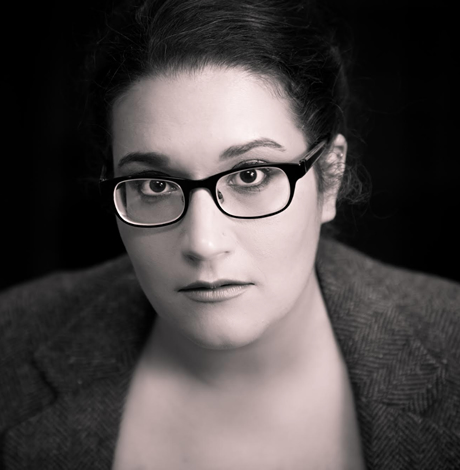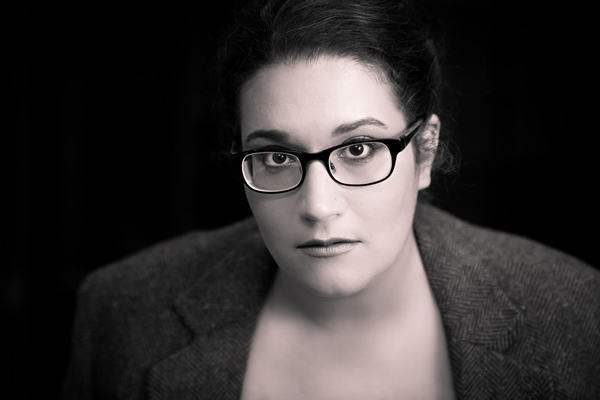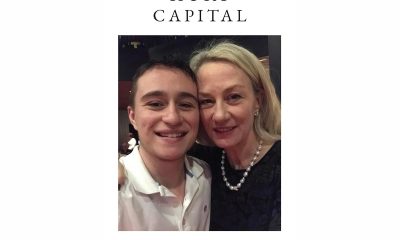Books
Queer author Carmen Maria Machado draws raves for ‘Her Body’ short story collection
Writer says family storytelling tradition, collegiate experiences inform her fiction


Author Carmen Maria Machado says her love of reading and the storytelling tradition of her family deeply inform her work. (Photo courtesy Tom Storm Photography)
All fiction writers need imagination. Carmen Maria Machado’s is so vivid, she sometimes passes it on to her characters.
“Sometimes I sat on the porch and gave imaginary interviews to NPR personalities,” says the narrator of “The Resident,” a short story in Machado’s debut collection “Her Body and Other Parties.” “”When I write, I feel like I’m being hypnotized,’ I told Terry Gross. ‘It was at that moment I knew everything was going to change,’ I told Ira Glass.’”
For most writers, such daydreams remain mere fantasies. Few authors become literary superstars or suddenly find themselves under the spotlight on NPR. Yet this is what happened to Machado, a 31-year-old queer writer.
Her short story collection “Her Body and Other Parties” (Graywolf Press), released in October, has received the attention usually bestowed on the work of literary giants such as Toni Morrison or Michael Cunningham. “Parties” was a finalist for the National Book Award, the Kirkus Prize and the National Book Critics Circle’s John Leonard Prize. It won the Bard Fiction Prize. It’s her first full-length work though she has had many of her stories published in various outlets.
“Parties” is unlike any previous short story collection. Women’s bodies, queerness and feminism pulsate through the tales in “Parties” from “Inventory” to “Difficult at Parties.” Yet the book isn’t didactic or the least bit doctrinaire. Like the horror movie “Get Out,” the stories pop with horror and comedy.
Women have joyous sex, even as people die worldwide from a virus spread by physical contact. A sexual assault survivor hears the inner thoughts of characters in porn. A novella “Especially Heinous: 272 Views of Law & Order: SVU,” is a piercing, but hilarious send up of “Law & Order: SVU” and its fascination with sexually traumatized women.
“The collection is that hallowed thing: an example of almost preposterous talent,” the Los Angeles Times said of “Her Body and Other Parties,” “that also encapsulates something vital but previously diffuse about the moment.”
Storytelling, Machado says during a Blade phone interview, is part of her family tradition. Her paternal grandfather came to the U.S. from Cuba; his wife was from Austria. They met as immigrants in New York. Her mother’s family is white.
“Storytelling, especially on the Cuban side of the family, is important,” Machado, an Allentown, Pa., native who now lives with her wife Val in Philadelphia, says. “My grandfather has dementia, but we can still recite stories back to him and he remembers.”
She incorporates that oral storytelling tradition in her work. Her love of reading and writing, as one might imagine, has deep roots.
As a child, Machado read voraciously. She went to the library and devoured books like candy, reading at breakneck speed, she says.
“All kids write stories. I wrote them and typed them out. I always loved the idea of being a writer.”
Machado sent her stories to publishers and authors. Her letters yielded no publishing offers, but, “my wife who works in publishing says that some delighted interns at the publishing houses must have loved my letters.”
To her surprise and delight, Machado heard back from Livia Bitton-Jackson, a Holocaust survivor and author of the memoir “I Have Lived a Thousand Years: Growing Up in the Holocaust.”
“In the book, Bitton-Jackson talked about how the poems she wrote were left behind when she was taken by the Nazis,” she says. “I wrote to her and asked what happened to her poems. One day, my mom, who was confused by it, said, ‘There’s a letter for you from Israel.’”
Bitton-Jackson told Machado that she didn’t get her poems back, but that she’d kept on writing.
“She asked me about myself,” she says. “It felt magical that a real person — a writer — wrote back to me.”
When she was young in the 1990s, Machado didn’t understand that she was queer.
“I had crushes on girls, but I didn’t think of it in that way. I didn’t have any framework,” she says. “I didn’t know anyone who was out and queer until I went to college.”
Machado graduated from American University in 2008 with a degree in visual media. During her years in Washington, she read the Blade as she was coming out.
“I thought, ‘Oh this is who I am,’” she says. “My parents were pretty chill, though they were a bit confused because I was lesbian/bi. They didn’t quite understand why I would date a guy, but they were great about it.”
Attitudes about being queer were different for some of Machado’s extended family.
“Some of them were very religious,” she says, “but I didn’t have to deal with a lot of that kind of nonsense. I feel extremely lucky.”
Machado went to college to study journalism, but quickly realized that wasn’t what she wanted to do, so she switched to literature and photography.
“I wanted to get loose with my sentences,” Machado says. “I didn’t have the blood thirst, the nose for news, to be a reporter.”
After graduating, Machado moved to Berkeley, Calif., working random jobs during the recession and enduring a bad break-up, which she says made her miserable. But she didn’t stop writing. A creative writing teacher, whom she calls “a lovely human being,” encouraged her to keep writing stories.
Her stint at the Iowa Writers’ Workshop from 2010-2012, where she earned a master’s degree, changed everything professionally for her.
“Suddenly, I was getting paid to be in grad school and write,” she says. “I didn’t have to worry about finding jobs. I had good health insurance. I could go to therapy and figure out my aesthetic.”
And, of course, her success with “Her Body” has helped fuel ongoing efforts. “House in Indiana,” a memoir about same-sex domestic violence is due in 2019.
“Same-sex violence isn’t talked about,” Machado says. “I wanted to talk about it.”
Kathi Wolfe, a writer and a poet, is a regular contributor to the Blade.
Books
Embracing the chaos can be part of the fun
‘Make Sure You Die Screaming’ offers many twists and turns

‘Make Sure You Die Screaming’
By Zee Carlstrom
c.2025, Random House
$28/304 pages
Sometimes, you just want to shut the door and forget what’s on the other side.
You could just wipe it from your memory, like it didn’t occur. Or create an alternate universe where bad things never happen to you and where, as in the new novel “Make Sure You Die Screaming” by Zee Carlstrom, you can pretend not to care.

Their mother called them “Holden,” but they’d stopped using that name and they hadn’t decided what to use now. What do you call an alcoholic, queer, pessimistic former ad executive who’s also “The World’s First Honest White Man,” although they no longer identify as a man? It’s a conundrum that they’ll have to figure out soon because a cop’s been following them almost since they left Chicago with Yivi, their psychic new best friend.
Until yesterday, they’d been sleeping on a futon in some lady’s basement, drinking whatever Yivi mixed, and trying not to think about Jenny. They killed Jenny, they’re sure of it. And that’s one reason why it’s prudent to freak out about the cop.
The other reason is that the car they’re driving was stolen from their ex-boyfriend who probably doesn’t know it’s gone yet.
This road trip wasn’t exactly well-planned. Their mother called, saying they were needed in Arkansas to find their father, who’d gone missing so, against their better judgment, they packed as much alcohol as Yivi could find and headed south. Their dad had always been unique, a cruel man, abusive, intractable; he suffered from PTSD, and probably another half-dozen acronyms, the doctors were never sure. They didn’t want to find him, but their mother called…
It was probably for the best; Yivi claimed that a drug dealer was chasing her, and leaving Chicago seemed like a good thing.
They wanted a drink more than anything. Except maybe not more than they wanted to escape thoughts of their old life, of Jenny and her death. And the more miles that passed, the closer they came to the end of the road.
If you think there’s a real possibility that “Make Sure You Die Screaming” might run off the rails a time or three, you’re right. It’s really out there, but not always in a bad way. Reading it, in fact, is like squatting down in a wet, stinky alley just after the trash collector has come: it’s filthy, dank, and profanity-filled. Then again, it’s also absurd and dark and philosophical, highly enjoyable but also satisfying and a little disturbing; Palahniuk-like but less metaphoric.
That’s a stew that works and author Zee Carlstrom stirs it well, with characters who are sardonic and witty while fighting the feeling that they’re unredeemable losers – which they’re not, and that becomes obvious.
You’ll see that all the way to one of the weirdest endings ever.
Readers who can withstand this book’s utter confusion by remembering that chaos is half the point will enjoy taking the road trip inside “Make Sure You Die Screaming.”
Just buckle up tight. Then shut the door, and read.
The Blade may receive commissions from qualifying purchases made via this post.
Books
Two new books on dining out LGBTQ-style
Visit nightclubs, hamburger joints, and a bathhouse that feeds customers

‘What is Queer Food? How We Served a Revolution’
By John Birdsall
c.2025, W.W. Norton
$29.99/304 pages
‘Dining Out: First Dates, Defiant Nights, and Last Call Disco Fries at America’s Gay Restaurants’
By Erik Piepenburg
c.2025, Grand Central
$30/352 pages
You thought a long time about who sits where.
Compatibility is key for a good dinner party, so place cards were the first consideration; you have at least one left-hander on your guest list, and you figured his comfort into your seating chart. You want the conversation to flow, which is music to your ears. And you did a good job but, as you’ll see with these two great books on dining LGBTQ-style, it’s sometimes not who sits where, but whose recipes were used.
When you first pick up “What is Queer Food?” by John Birdsall, you might miss the subtitle: “How We Served a Revolution.” It’s that second part that’s important.

Starting with a basic gay and lesbian history of America, Birdsall shows how influential and (in)famous 20th century queer folk set aside the cruelty and discrimination they received, in order to live their lives. They couldn’t speak about those things, he says, but they “sat down together” and they ate.
That suggested “a queer common purpose,” says Birdsall. “This is how who we are, dahling, This is how we feed our own. This is how we stay alive.”
Readers who love to cook, bake or entertain, collect cookbooks, or use a fork will want this book. Its stories are nicely served, they’re addicting, and they may send you in search of cookbooks you didn’t know existed.
Sometimes, though, you don’t want to be stuck in the kitchen, you want someone else to bring the grub. “Dining Out” by Erik Piepenburg is an often-nostalgic, lively look at LGBTQ-friendly places to grab a meal – both now and in the past.

In his introduction, Piepenburg admits that he’s a journalist, “not a historian or an academic,” which colors this book, but not negatively. Indeed, his journeys to “gay restaurants” – even his generous and wide-ranging definitions of the term – happily influence how he presents his narrative about eateries and other establishments that have fed protesters, nourished budding romances, and offered audacious inclusion.
Here, there are modern tales of drag lunches and lesbian-friendly automats that offered “cheap food” nearly a century ago. You’ll visit nightclubs, hamburger joints, and a bathhouse that feeds customers on holidays. Stepping back, you’ll read about AIDS activism at gay-friendly establishments, and mostly gay neighborhood watering holes. Go underground at a basement bar; keep tripping and meet proprietors, managers, customers and performers. Then take a peek into the future, as Piepenburg sees it.
The locales profiled in “Dining Out” may surprise you because of where they can be found; some of the hot-spots practically beg for a road trip.
After reading this book, you’ll feel welcome at any of them.
If these books don’t shed enough light on queer food, then head to your favorite bookstore or library and ask for help finding more. The booksellers and librarians there will put cookbooks and history books directly in your hands, and they’ll help you find more on the history and culture of the food you eat. Grab them and you’ll agree, they’re pretty tasty reads.
The Blade may receive commissions from qualifying purchases made via this post.

You’re going to be on your feet a lot this month.
Marching in parades, dancing in the streets, standing up for people in your community. But you’re also likely to have some time to rest and reflect – and with these great new books, to read.
First, dip into a biography with “Marsha: The Joy and Defiance of Marsha P. Johnson” by Tourmaline (Tiny Rep Books, $30), a nice look at an icon who, rumor has it, threw the brick that started a revolution. It’s a lively tale about Marsha P. Johnson, her life, her activism before Stonewall and afterward. Reading this interesting and highly researched history is a great way to spend some time during Pride month.
For the reader who can’t live without music, try “The Dad Rock That Made Me a Woman” by Niko Stratis (University of Texas Press, $27.95), the story of being trans, searching for your place in the world, and finding it in a certain comfortable genre of music. Also look for “The Lonely Veteran’s Guide to Companionship” by Bronson Lemer (University of Wisconsin Press, $19.95), a collection of essays that make up a memoir of this and that, of being queer, basic training, teaching overseas, influential books, and life.
If you still have room for one more memoir, try “Walk Like a Girl” by Prabal Gurung (Viking, $32.00). It’s the story of one queer boy’s childhood in India and Nepal, and the intolerance he experienced as a child, which caused him to dream of New York and the life he imagined there. As you can imagine, dreams and reality collided but nonetheless, Gurung stayed, persevered, and eventually became an award-winning fashion designer, highly sought by fashion icons and lovers of haute couture. This is an inspiring tale that you shouldn’t miss.
No Pride celebration is complete without a history book or two.
In “Trans History: From Ancient Times to the Present Day” by Alex L. Combs & Andrew Eakett ($24.99, Candlewick Press), you’ll see that being trans is something that’s as old as humanity. One nice part about this book: it’s in graphic novel form, so it’s lighter to read but still informative. Lastly, try “So Many Stars: An Oral History of Trans, Nonbinary, Genderqueer, and Two-Spirit People of Color” by Caro De Robertis (Algonquin Books of Chapel Hill. $32.00) a collection of thoughts, observations, and truths from over a dozen people who share their stories. As an “oral history,” you’ll be glad to know that each page is full of mini-segments you can dip into anywhere, read from cover to cover, double-back and read again. It’s that kind of book.
And if these six books aren’t enough, if they don’t quite fit what you crave now, be sure to ask your favorite bookseller or librarian for help. There are literally tens of thousands of books that are perfect for Pride month and beyond. They’ll be able to determine what you’re looking for, and they’ll put it directly in your hands. So stand up. March. And then sit and read.




















